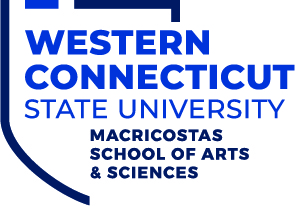
Professor Paul Echeverria
Founding Director of DIMA,
Assistant Professor, Communication and Media Arts
This is the first in a series of faculty interviews conducted and written by talented WCSU MFA student, John Bonanni. Our goal is to celebrate and learn from some of WCSU’s dedicated teachers and scholars.
The truth is on the wall in Professor Paul Echeverria’s “corner” office. The current schedule of the iconic Film Forum is prominently displayed just inside the entrance to a room filled with film, camera and sound equipment. Bearing witness to uncreative commercials and music videos from his experience in a film rental house, Professor Echeverria sought a platform to develop experimental and independent filmmaking as an art and a career. Progressive jaunts in digital filmmaking at the Manhattan Youth Community Center and as a fifth-grade teacher at Public School # 85 in New York City made this professor an experimental media sage.
Professor Echeverria is primarily a storyteller, and in his present position as Founding Director of the Digital Interactive Media Arts Program, or DIMA, his objective is to develop the pure art found in the work of student expression and integrate the process within an interdisciplinary framework that includes digital interactive media arts, computer science, and art.
His biggest challenge is preventing his students from being affected by the contamination commercially generated art that infiltrates the student’s creative perspective. Social media, advertising, unrelenting aural and visual technologies inevitably influence that creativity, transforming it through a branding process into a marketable product with broader appeal. The art then becomes profitable. Professor Echeverria reflects that the art “becomes sanitized and loses the purity” of its original content and artistic purpose. He advises that the result eventually “makes the students consumers of art rather than producers.”
He also fights the trend to resist media arts as educational tool. Media Arts still bears the stigma of an elective discipline. Professor Echeverria advocates the discipline deserves inclusion into the general curriculum as a respected communicative tool. He dismisses the false concern that technology will replace the written word. He reminds us “the book is the longest lasting form of media available,” and “there was no recorded media or [reproduced] sound for five hundred years.”
His students produce text printed magazines. He reminds us that “there would be no Twitter without the Gutenberg printing press.” Learning the new language of technology just increases the vocabulary in which we communicate. His curriculum ensures this by including tech heavy classes.
Protecting the “avantgarde” purity of student generated experimental filmmaking is essential to the pedagogical objective of the department. Professor Echeverria notes that nearly every experimental art form runs the risk of morphing into a commercial product. He remarks that the only survivor of an experimental art form that still retains artistic purity is punk rock, a musical art form that never mainstreamed into wide commercial appeal.
Many students come into the program today only knowing the mainstream product of the art. His advice is to “find something, a movement or form that will inspire to break the rules. Google your dreams, find out what they are looking for, then tailor your path to the job.”
Pretty sage advice from a free-thinking artist with a well-organized sense of direction.
Interview conducted by John Bonanni & Ronald Samul
Author Bio: John Bonanni spent the last forty years in the theatre on tour, on Broadway, at Radio City Music Hall and many places in between managing every sensitive personality he encountered. He now writes about them, among other things. His articles have appeared in Adelaide Literary Magazine, Inspired Living Magazine, and Senior Outlook Today. He is currently enrolled in the MFA in Creative and Professional Program at Western Connecticut State University. theliteraryfish@gmail.com

